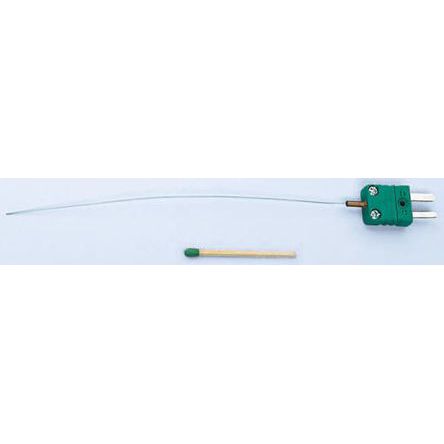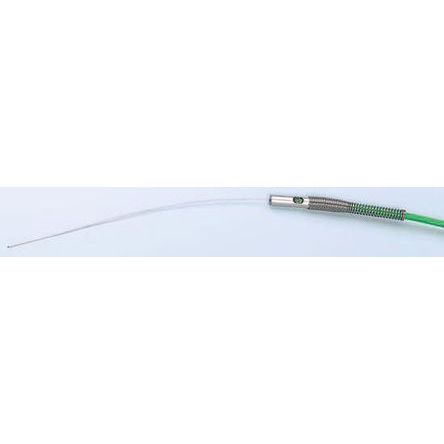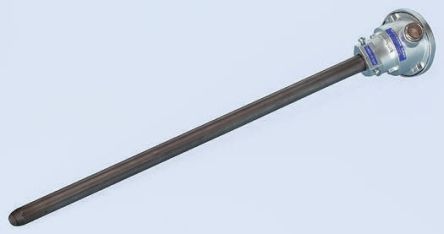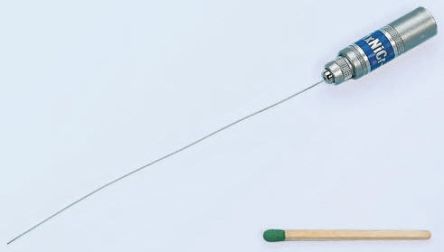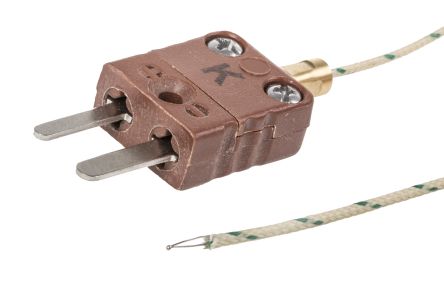- Automation & Control Gear
- Cables & Wires
- Enclosures & Server Racks
- Fuses & Circuit Breakers
- HVAC, Fans & Thermal Management
- Lighting
- Relays & Signal Conditioning
- Switches
- Batteries & Chargers
- Connectors
- Displays & Optoelectronics
- ESD Control, Cleanroom & PCB Prototyping
- Passive Components
- Power Supplies & Transformers
- Raspberry Pi, Arduino, ROCK, STEM Education & Development Tools
- Semiconductors
Thermocouples Reckmann
A thermocouple is a type of temperature probe that generates a voltage signal based on the temperature difference between two different metals or alloys. This temperature sensor consists of two dissimilar metal wires joined together at one end, forming a junction. When this junction is exposed to a temperature gradient, it produces a small voltage (which is known as the measuring junction) that is proportional to the temperature difference. You can read more about these sensors in our bespoke thermocouples guide.
This phenomenon is known as the Seebeck effect. It occurs because different metals have different electron configurations, resulting in varying electron densities and thermal conductivities. As a result, when the junction is exposed to a temperature difference, an electric current is induced due to the flow of electrons from the hotter metal to the colder metal.
The voltage produced by the thermocouple can be read and measured by a voltmeter or a specialised temperature measurement device. By knowing the relationship between the temperature and the voltage output, typically described in a calibration table or equation specific to the type of thermocouple being used, the temperature at the measurement point can be determined.
Types of Thermocouples and Their Applications
There is a wide range of thermocouple types available, each catering to specific temperature ranges and environmental conditions.
- Type J (Iron-Constantan): These thermocouples, featuring an iron wire and a copper-nickel (constantan) wire, are suitable for general-purpose applications within a temperature range of approximately 0°C to 760°C. They find common use in industrial processes, ovens and kilns.
- Type K (Chromel-Alumel): Comprising a chromel (nickel-chromium) wire and an alumel (nickel-aluminium) wire, Type K thermocouples boast a wider temperature range, from -200°C to 1350°C. They are widely employed in industrial settings, power plants and aerospace applications.
- Type T (Copper-Constantan): With a copper wire and a constantan wire, Type T thermocouples excel in low-temperature measurements, ranging from -200°C to 350°C. They find use in food processing, refrigeration and cryogenic applications.
- Type E (Chromel-Constantan): Constructed from a chromel wire and a constantan wire, Type E thermocouples offer high sensitivity and accuracy at lower temperatures. They are commonly used in laboratories and research settings.
Thermocouples vs RTDs and Thermistors
While thermocouples, resistance temperature detectors (RTDs) and thermistors all serve as temperature sensors, they differ in their operating principles, characteristics and applications.
- Thermocouples: Offer a wide temperature range, robustness, and affordability. However, they may require calibration and are less accurate than RTDs.
- RTDs: Provide high accuracy and stability over a moderate temperature range. However, they are more expensive and less durable than thermocouples.
- Thermistors: Offer high sensitivity and fast response times but have a limited temperature range and require linearization for accurate measurements.
Thermocouple Sensor Calibration and Accuracy
Thermocouple calibration involves comparing the thermocouple’s output voltage to a known reference temperature to establish an accurate relationship. Factors like ambient temperature, wire quality and junction contamination can influence thermocouple accuracy. Regular calibration ensures reliable and precise temperature measurements.
What Are Thermocouples Used for?
thermocouples’ ability to measure a broad spectrum of temperatures and withstand harsh environments makes them invaluable in numerous applications, spanning domestic and industrial settings. Some examples include:
- Thermostats and HVAC Systems: Thermocouples are utilised in heating, ventilation and air conditioning (HVAC) systems to monitor and regulate temperatures. This helps maintain desired comfort levels while optimising energy consumption.
- Industrial Processes: Thermocouples are widely used in industrial settings to monitor and control critical temperatures in various processes, such as those found in furnaces, kilns, power plants and refineries. This ensures efficient operation, product quality and safety.
- Automotive and Aerospace: Thermocouples are employed in the automotive and aerospace industries to measure key parameters like exhaust gas temperatures, engine oil temperatures, and turbine inlet temperatures. This data is used to optimise performance, prevent overheating and ensure safety.
- Food Processing and Safety: In the food industry, thermocouples help maintain proper temperatures during cooking, pasteurisation, refrigeration and storage. This ensures food safety by preventing foodborne illnesses and helps maintain product quality.
- Scientific Research and Laboratories: Thermocouples are essential tools in scientific research and laboratories, providing accurate temperature measurements for various experiments and analyses across different fields, including materials science and biotechnology.
Your Trusted Thermocouples Supplier and Manufacturer
When it comes to sourcing high-quality thermocouples, RS is your reliable supplier and manufacturer in Australia. We offer a wide selection from reputable brands like Electrotherm, Reckmann and Turck, ensuring you find the perfect solution for your temperature measurement needs. Besides thermocouples, we also have thermocouple cables and thermal paste to cater to all aspects of your temperature sensing and management requirements.
Browse the broad range of thermocouples RS has to offer and buy today with next day delivery options available. For more information on our delivery options, please refer to our delivery policy.
Explore the new look of the category page
16 Products showing for Thermocouples Reckmann
Popular Searches
Related links
- RS PRO 4mm Probe, BS Standard
- RS PRO Type K Thermocouple 2m Length, 6mm Diameter → +350°C
- RS PRO Thermocouple Wall Port with Integral Type K Thermocouple...
- Testo K Type K Thermocouple Temperature Probe 1.5mm Diameter, +400 °C Max
- FLIR TA60 Thermocouple Probe with Adapter, For Use With Type K...
- RS PRO Type K Thermocouple Cable/Wire Unscreened +700°C Max, 1/0.711mm
- RS PRO Type K Thermocouple Air Temperature Probe 4mm Diameter, +750 °C Max
- RS PRO Type K Washer Thermocouple 2m Length, 3.5mm Diameter → +350°C
